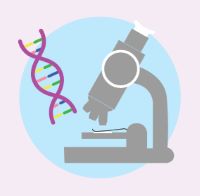Genetic testing and counselling
When you have a genetic test, this is to look for the factor VIII (F8) or factor IX (F9) gene alteration that causes haemophilia.
You may already have had a clotting factor test with a normal result and need to find out if you have the gene alteration and are a carrier. The genetic test result will nearly always give you a definite answer.
It is important to think about genetic testing ahead of time if you are planning to have children.
Who can have a genetic test?
It is recommended that genetic testing should be available to females:
- who are obligate carriers (see Genes and inheritance)
- who are relatives of people with haemophilia or of females who may be haemophilia carriers – if inheritance patterns suggest these females may also be haemophilia carriers
- who have bleeding symptoms that suggest they may be affected by haemophilia. (5)
Where can you have a genetic test?
Usually your state or territory clinical genetics service or your Haemophilia Treatment Centre will undertake your genetic testing. They can also provide genetic counselling.
They will use a specialist laboratory to analyse the results.
You will need a referral.
If you are speaking to your GP about genetic testing, ask them to refer you to a Haemophilia Treatment Centre who will advise you or arrange the appropriate testing.
How much do these tests cost?
There may be some costs involved in genetic testing, but this can vary.
Speak to your HTC or the genetic counsellor about any costs involved.
The steps in genetic testing
Genetic testing is a process which involves several steps. Before you have the blood test for genetic testing, you will be offered education and genetic counselling so that you can give informed consent.

1a. Information, discussion and counselling
You will have the opportunity for discussion with a haemophilia specialist and/or genetic counsellor before giving permission to have the test.

1b. Mapping the family tree
They will look at your family tree with you to identify other family members who may have the gene alteration.

2. Giving consent to having the test
You will be asked to sign a consent form for the genetic test. You can choose not to go ahead with genetic testing or withdraw your consent at any stage before the result is issued by the laboratory.
A genetic test for an obligate carrier is also a paternity test and this needs to be part of the discussion.
If the testing is for your daughter, it may need to be delayed until she is old enough to give informed medical consent herself. You may choose to only have factor level testing in a child.

3. Having a blood test
Genetic testing is a blood test.
Your doctor or nurse practitioner will request the test for you and explain where you can have the test done locally.
About a teaspoon of blood is taken in the test. A little more blood may be taken if you are having other blood tests at the same time, eg factor level testing.

4. Genetic analysis in a laboratory
Genetic testing results may take weeks to months, depending on whether the family gene alteration is already known.
Where possible, a family member who has been clinically diagnosed with haemophilia should be tested first to identify the family alteration. This is usually a male family member with haemophilia. Knowing the family gene alteration makes genetic testing easier and quicker.

5. Receiving the results
If you are tested through a genetic testing service, you will discuss and agree on the way to receive your genetic test results during the genetic counselling.
In all cases, you will usually receive your results in a face-to-face or formal telehealth consultation with your doctor, nurse practitioner or genetic counsellor. They will explain what the results mean and provide other education and genetic counselling to suit your needs.
They can also refer you to a psychologist or genetic counsellor.
The impact of receiving the results is very individual and will vary from person to person. You may want to have a support person with you when you receive your results.
‘When I had genetic testing, I went in for the blood test and got the results only a few weeks later as I was due for surgery.
I had genetic counselling through the Haemophilia Treatment Centre Director.
It helped to make me aware of who else in my family needed to be tested. I was the very first member of my family to have the genetic testing done and to be diagnosed.’
To test or not to test?
Many people find that genetic testing gives them a lot to think about. For women, girls and parents of girls there are many issues to consider.
What to consider with genetic testing
- What are the benefits of genetic testing at this stage?
- Will genetic testing help to understand a woman or girl’s bleeding disorder? If she is a child, will it provide helpful information now, or would it be better to wait until she is older? Would factor level testing provide enough information about her bleeding disorder at this time?
- Some women or girls with the gene alteration may not have bleeding symptoms. Will genetic testing be important to confirm whether she is a haemophilia carrier?
- What is the effect of genetic testing on a woman or girl’s perception of herself and on her relationships, now and in the future? If she has a partner, would it be valuable to involve them?
- What is her understanding of what it’s like to have haemophilia with current treatments?
- What will be the impact on her children and other family members? Could there be unexpected news from genetic testing (eg, non-paternity/different biological father) that may impact on relationships?
- How important are her personal religious and cultural beliefs in decision-making? Would she like to speak to anyone else about it, eg a spiritual leader?
- If she has genetic testing, her results will be in her medical record for her lifetime. She may have to answer questions about genetic testing in the future if she is applying for certain types of insurance and sometimes in other circumstances. How will this impact on her in the future?
- What costs are involved?
- Are there any other issues relevant to her personal situation?
Emma's story
 Emma is expecting to be an obligate carrier of haemophilia as her father Steve has haemophilia. She is considering IVF treatment and has genetic testing to confirm her gene alteration.
Emma is expecting to be an obligate carrier of haemophilia as her father Steve has haemophilia. She is considering IVF treatment and has genetic testing to confirm her gene alteration.
Testing shows she does not carry the gene alteration as she expects. When she brings this up with her mother, she discovers that her biological father is not Steve but someone else.
Who can help?
- The team at the Haemophilia Treatment Centre can help with information and advice about haemophilia, genetics and genetic testing, and can provide a referral to a genetic counsellor or other counselling, if needed.
- You, your partner or family can talk to the Haemophilia Treatment Centre or the counsellor individually or together before testing. Many find this helpful.
- Your general practitioner (GP) or any other doctor can also refer you to a genetic counsellor or other counselling.
If you start exploring genetic testing but decide against it, you do not have to complete the process.
For more information about genetic testing, see the Policies and Position Statements on the Human Genetics Society of Australasia website – www.hgsa.org.au.
When to test?
There is a lot of discussion about the best age for females to have genetic testing for haemophilia. This is because the effects of having a genetic test last a lifetime.
In Australia a common time to have a genetic test for haemophilia is when a young woman reaches childbearing age and can understand what will happen with testing and what it means and make the decision for herself.
However, some parents may wish to consider genetic testing of their daughter when she is a baby or a child.
As a parent this can be a difficult discussion. It will be important to consider both genetic and factor level testing to understand the benefits of each test and the information they can provide. Would you choose to have both tests, or only factor level testing as a priority to manage bleeding problems?
You may find it valuable to talk through the issues with the team supporting you during genetic counselling. This might include your daughter’s specialist doctor, the other members of the HTC team, the genetic counsellor and any others whose understanding and advice you find helpful.
What are the issues for when to test?
Will there be more benefits than harm for your daughter to have genetic testing now?
- Is she mature enough to understand what it means?
- What are the health and psychological benefits for her vs the harm for her self-esteem and sense of identity?
- When is it best for her to know for her family planning – finding out the risks for her future children before she becomes pregnant?
- This will be making a decision to have a test that stays on her medical record permanently – should she be the one to choose whether she wants to have this information?
- What would be the impact on mental wellbeing for you and your daughter?

